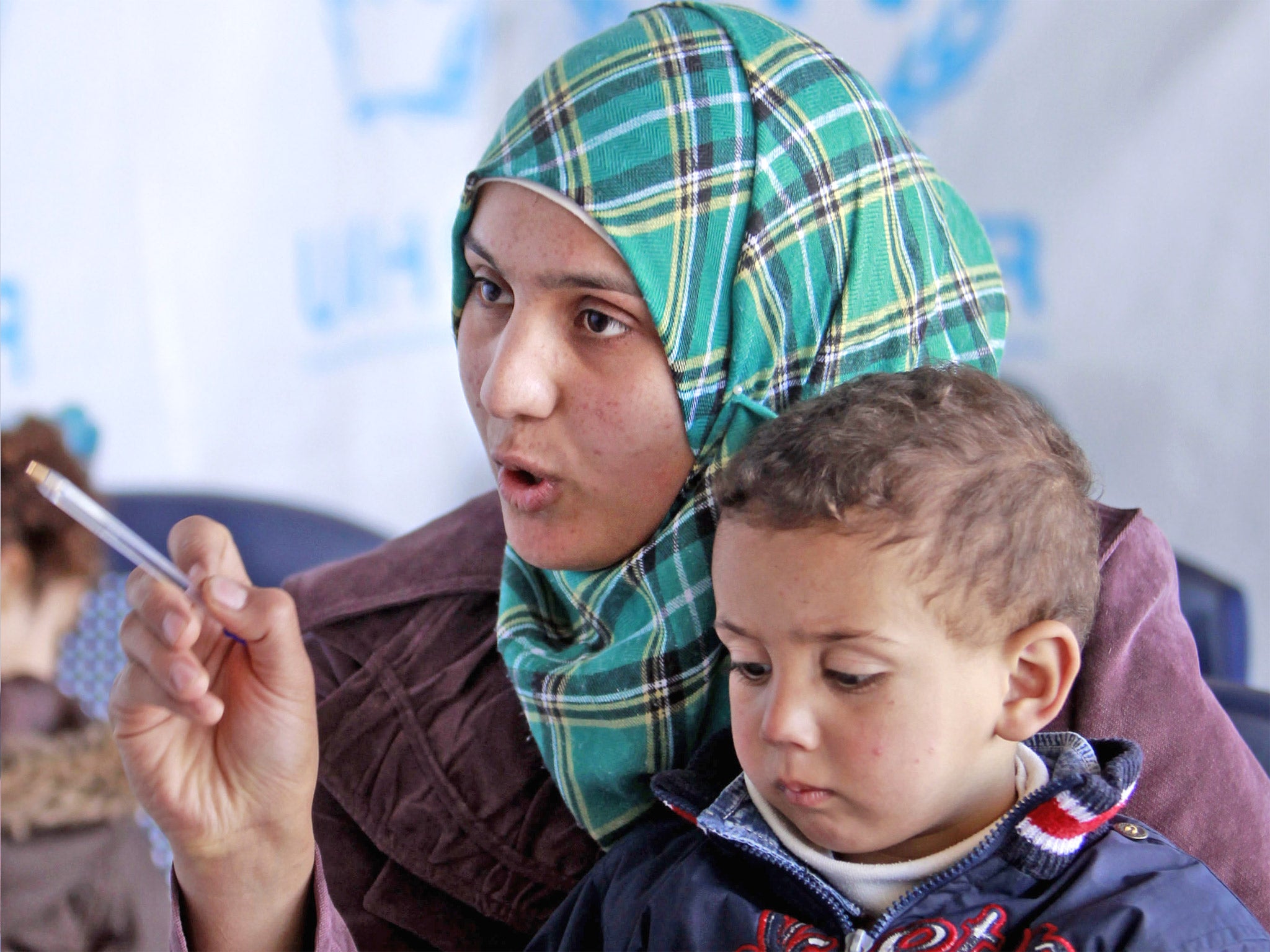Meet Bushra - the 19-year-old mother who became the millionth refugee to flee Syria
In excess of half the refugees are children who face the prospect of having their lives forever blighted by the conflict

Your support helps us to tell the story
From reproductive rights to climate change to Big Tech, The Independent is on the ground when the story is developing. Whether it's investigating the financials of Elon Musk's pro-Trump PAC or producing our latest documentary, 'The A Word', which shines a light on the American women fighting for reproductive rights, we know how important it is to parse out the facts from the messaging.
At such a critical moment in US history, we need reporters on the ground. Your donation allows us to keep sending journalists to speak to both sides of the story.
The Independent is trusted by Americans across the entire political spectrum. And unlike many other quality news outlets, we choose not to lock Americans out of our reporting and analysis with paywalls. We believe quality journalism should be available to everyone, paid for by those who can afford it.
Your support makes all the difference.Bushra, a 19 year-old mother of two, became the one millionth registered refugee from the Syrian civil war today as she gave here details to a UNHCR official in the Lebanese city of Tripoli.
Bushra refused to give her full name for fear of reprisal, but told reporters that she escaped the restive city of Homs several weeks ago and had since been forced to live in Tripoli, sharing a room with 20 other people.
“Our life conditions are very bad, it is very expensive here (in Lebanon) and we cannot find any work,” she said at the UNHCR centre in the city.
The dark milestone will mean little to Bushra or the others who have made the often harrowing journey to flee the bitter, bloody and seemingly endless war, which in a week’s time will be two years old. More desperate perhaps is the fact that in excess of half of the million people are children who face the prospect of having their lives forever blighted by the conflict.
More than a third of the refugees have left Syria since the start of this year, putting ever greater pressure on camps in Lebanon, Jordan, Iraq and Turkey. The head of the UNHCR today warned that Syria was heading towards a “full scale disaster”.
“With a million people in flight, millions more displaced internally, and thousands of people continuing to cross the border every day, Syria is spiralling towards full-scale disaster,” said UN High Commissioner for Refugees António Guterres. “We are doing everything we can to help, but the international humanitarian response capacity is dangerously stretched. This tragedy has to be stopped.”
Those crossing Syria’s borders – many coming from the battle-scarred cities of Homs and Aleppo - may now avoid the risk to their lives caused by bombs and bullets, but the UN has warned that funding for the over-crowded refugee camps is dangerously low. Alexis Masciarelli, Unicef’s communications officer in Jordan, said: “Initially the donor countries were very generous, but the money is beginning to dry up – it’s now a very serious problem. Our estimate at the start of the year was that there would be 300,000 new refuges by the end of June and that we would need $57m – we’ve only raised 20 per cent of that, and the 300,000 will be in the camps by the end of the month.”
As well as those escaping Syria, in excess of 70,000 people are now thought to have been killed in the fighting, which, with President Bashar al-Assad still looking secure in Damascus and the rebels controlling large areas of the country, looks set to continue for some time.
There has been increasing pressure on Western governments to intervene, but they have largely been stymied by Russia and China in attempting to find an international solution to the crisis.
William Hague, the Foreign Secretary, told the House of Commons today that the West agreed that there was no case for military intervention in Syria, but admitted that the world’s efforts to try to end the bloodshed there had been “an abject failure”.
A number of Gulf nations, particularly Qatar, are thought to have provided weaponry to the rebels. The UK, and others in the West, has restricted support to medical provisions and communications equipment.
In his speech, Mr Hague announced that the UK will provide new armoured vehicles and body armour to opposition forces in Syria, which would “help save lives”. The new provisions, worth £13m, will also include medication and other “non-lethal” military and logistical equipment. The move followed a similar announcement by the US government last week, when it offered £40m worth of similar aid.
The UK was unable to “look the other way,” Mr Hague told the Commons. “The cabinet is in no doubt that this is a necessary, proportionate and lawful response to a situation of extreme humanitarian suffering, and that there is no practicable alternative,” he said.
“All our assistance will be carefully calibrated and monitored as well as legal, and will be aimed at saving life, alleviating this human catastrophe and supporting moderate groups.”
In a fresh development this evening, a group of Syrian rebels calling themselves the ‘Martyrs of Yarmouk’ – Yarmouk is the name of a Palestinian refugee camp in Damascus although it is not known if the group is linked – said they had seized a convoy of United Nations observers near the Golan Heights. In a YouTube video, a spokesman for the group said that the convoy would be released only when forces loyal to -Assad withdrew from the nearby village of Jamla.
Join our commenting forum
Join thought-provoking conversations, follow other Independent readers and see their replies
Comments